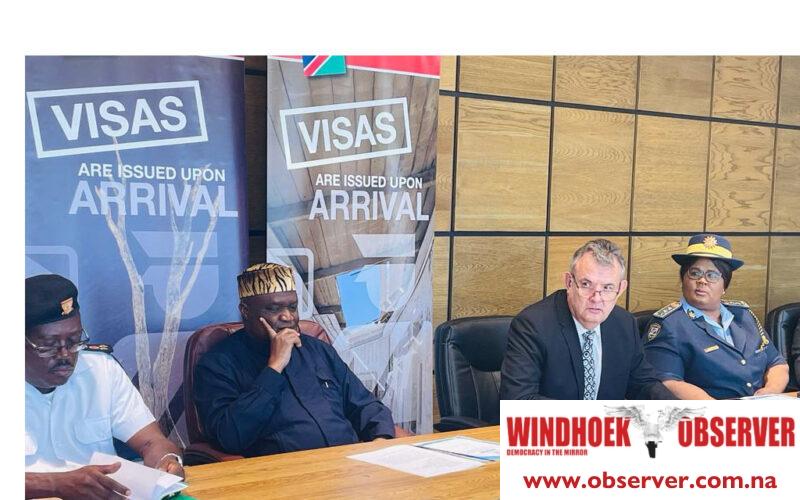Niël Terblanché
Dr Albert Kawana, the Minister of Home Affairs, Immigration Safety and Security, officially announced the expansion of the Visa on Arrival program at five entry points on the main road corridors that connect Namibia to neighbouring countries.
The five border posts are Oshikango, Mohembo, Ariamsvlei, Oranjemund, and Noordoewer.
Previously Visa on Arrival was only available at the country’s main international airports in Windhoek and Walvis Bay.
Kawana made the announcement at a briefing at the Ministerial headquarters in Windhoek earlier today where he said that the initiative is aimed at enhancing Namibia’s attractiveness as a prime tourism and investment destination.
According to the minister, tourism in Namibia is experiencing a significant upsurge, largely because of innovative government initiatives like online visa applications and the Visa on Arrival program.
He said that the addition of the program at the five border posts on the main road entry corridors is set to further streamline the entry process for tourists and visitors while also reinforcing hassle-free and welcoming entry protocols.
Kawana emphasized the convenience of paying visa fees online directly into the State Revenue Account. He said the process will add to the seamless process and eliminate the need for physical cash transactions.
“This initiative not only simplifies the entry process but also enhances transparency and reduces the potential for financial mismanagement,” he said.
Kawana said that the expansion of the program means that tourists from countries without Namibian diplomatic presence, who previously faced challenges in securing visas, can easily obtain visas upon arrival.
“This adjustment is part of a broader strategy to foster international tourism and investment, with over 58 countries worldwide now enjoying the benefits of this policy, spanning from African nations like Benin and Uganda to global countries including Argentina, Singapore, and the United Arab Emirates,” he said.
According to the minister, categories of visitors eligible for visas on arrival, include bona fide tourists, potential investors, attendees of meetings and seminars, and those on medical or family visits.
“However, individuals seeking employment in Namibia would still be required to secure work permits in advance,” he added.
Kawana added that the policy, strengthens Namibia’s dedication to African integration and economic advancement and it is aligned with the African Union’s vision for a visa-free continent.
The Visa on Arrival policy also reiterates Namibia’s strategic efforts to not only boost its tourism sector but also to ensure that the economic and social development benefits are maximized without compromising national security.
The minister urged customs and immigration officials to maintain high standards of professionalism, integrity, and friendliness towards tourists and visitors to ensure the success of this initiative.
According to Kawana, the Visa on Arrival program is set to be a key element in the nation’s journey towards becoming a more accessible, secure, and preferred tourism and business destination.




